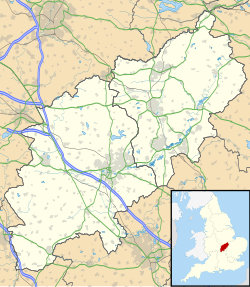| Wood Burcote | |
|---|---|
Location within Northamptonshire | |
| OS grid reference | SP695465 |
| Unitary authority | |
| Ceremonial county | |
| Region | |
| Country | England |
| Sovereign state | United Kingdom |
Wood Burcote is a hamlet located less than one mile south of Towcester in West Northamptonshire in the English county of Northamptonshire. It takes its name from a small wood above the village which overlooks the valley of the River Tove. The wood is carpeted with bluebells and ramsons in the Spring, suggesting it is the remnant of an ancient woodland.
